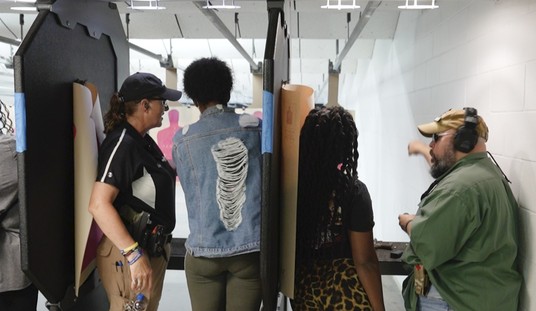A lawsuit challenging the constitutionality of Colorado’s “red flag” firearms seizure law that went into effect in January is still moving forward, and the state’s Attorney General is weighing in on the legality of the law in a new brief filed in state court late last week.
This particular lawsuit wasn’t brought by any Second Amendment organization, but rather an individual named David Gatton, who was the recipient of a Extreme Risk Protection Order back in January, in part because of threats Gatton had made several months earlier.
In texts to his adoptive father in January and March last year, David Gatton, a 31-year-old military veteran, threatened to commit mass shootings, investigators say.
He was arrested in March 2019 for retaliating against a witness or victim, a Class 3 felony, and inciting destruction of life or property, a Class 6 felony.
In the texts — which Gatton admitted to sending — he said he was struggling to find work and that if his adoptive parents didn’t stop asking him to pay back money he owed them, he would enact his plan to “kill a lot of people.”
When his father asked why, Gatton said it would help him relieve stress and “make me laugh.”
In another text, Gatton said he planned to be “a serial campus shooter” by shooting at two campuses. His texts did not name any specific schools as part of his plan, according to arrest documents.
As The Coloradan notes, the criminal case was put on hold while Gatton made his way through the state’s mental health system. Police claim that options for treatment were limited because of the open status of the criminal case, so in early January prosecutors began moving towards starting the criminal proceedings against Gatton. Before they did, however, the Latimer County Sheriff’s Office filed it’s first red flag petition, seeking to take Gatton’s guns away from him.
Gatton argues that his Second and Fourteenth Amendment rights are being violated by the state’s new red flag law, but AG Weiser argues that no right is absolute.
While the Supreme Court in Heller held that a complete ban on handgun possession violates the Second Amendment, the Court has provided little other explicit guidance for regulations that impose lesser burdens on the right to bear arms. Courts have largely coalesced around a two-step approach. A reviewing court first determines whether the law burdens conduct falling within the scope of the Second Amendment, and if it does, then applies an appropriate level of scrutiny.
The constitutionality of the Violence Prevention Act may be resolved at the first step of the inquiry because the Act does not fall within the scope of the Second Amendment. The Second Amendment is aimed at “the right of law-abiding, responsible citizens to use arms in defense of hearth and home.”
When it comes to red-flag statutes, other courts have concluded that the laws do “not implicate the [S]econd [A]mendment” because they do “not restrict the right of law-abiding, responsible citizens to use arms in defense of their homes,” but rather restrict access only by those “whom a court has adjudged to pose a risk of imminent physical harm to themselves or others.”
Gatton may not be the most sympathetic of plaintiffs, but that doesn’t mean that Weiser’s argument is a good one. While no constitutional right may be absolute, according to the law, that doesn’t mean that every gun control law stands up to judicial scrutiny. Weiser and the courts he cite use circular logic to claim that the Second Amendment doesn’t apply to people subjected to a red flag order because they’re not considered “law abiding.” Why aren’t they considered law-abiding? Because they’re subject to a red flag order.
Here’s the thing though; in Colorado, Extreme Risk Protection Orders aren’t criminal matters. They’re heard in civil court instead. In fact, public defenders aren’t an option for those subjected to a red flag firearms order because they’re not criminal matters. So how can Weiser claim that red flag orders don’t implicate the Second Amendment? Unless we’re talking about people who have lost their right to own a firearm because they’ve been adjudicated mentally defective or they’ve been convicted of a felony offense or domestic violence misdemeanor, everyone subject to a red flag firearms order should be considered “law abiding” by the court system.
Even if the Second Amendment is implicated, Weiser goes on to argue, the state’s red flag law should be upheld under an intermediate scrutiny standard of review.
The Act is appropriately tailored in several ways to have a substantial relationship to the State’s interest. First, the Act focuses on a very small group of people. It covers only those who have been subjected to rigorous judicial findings that they pose a significant risk to themselves or others. Second, the Act is limited in time. Even following entry of an Extreme Risk Protection Order, a respondent’s ability to bear arms is curtailed only for a defined period of time. An Extreme Risk Protection Order does not permanently alter his or her ability to purchase, own, or use firearms. A respondent may fully engage in these activities when the conditions that lead to the imposition of the Extreme Risk Protection Order are resolved. For these reasons, the Act is a measured method of achieving the State’s interest in violence prevention and does not violate the Second Amendment.
It’s true that a red flag law isn’t as sweeping in its scope as, say, a ban on handguns. However, despite the temporary (at least in theory) nature of the Extreme Risk Protection Orders, it’s hard to say that the law is narrow in scope when it allows for a process by which any legal gun owner can have their rights stripped from them without being accused of a crime, much less convicted of one. Additionally, while the red flag orders may come with an expiration date, the state can always move to extend those orders as often as they wish, and still use the same low standard of proof that’s far below what would be required of prosecutors in a criminal trial.
Even as the Gatton case is making its way through the state’s court system, another challenge to the state’s law filed last May, is also still active. That case focuses on how the red flag bill became law.
The bill was signed into law by Governor Jared Polis in April, but soon after, it was challenged with a lawsuit headed up by the Rocky Mountain Gun Owners, a non-profit gun rights advocacy group in Colorado.
The lawsuit claims House Democrats hampered the legislative process when a request by Republicans to read the bill aloud was not fulfilled.
That lawsuit wasn’t enough to prevent the Extreme Risk Protection Order legislation from going into effect in January, but cases like Gatton’s are going to continue to pop up, and rightfully so, unless the law changes or the state Supreme Court upholds the measure.









